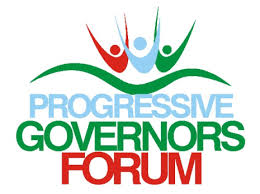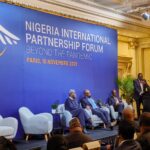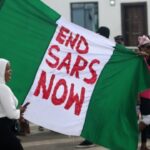Politics

…Accuses NASS of smuggling Section 87 into bill
The Director-General of the Progressive Governors Forum (PGF), Salihu Moh Lukman, faulted the National Assembly in the choice of direct primary as mode for political parties to elect candidates for future election
Mohammed, who also accused the National Assembly of inserting the controversial Section 87 which dwelt on mode of party primary into the bill, backed the APC governors in opposing the position of the National Assembly members in a statement he issued Friday in Abuja, argued that the direct primary option would remain cumbersome, especially as most political parties have no data of its members
Using the party’s direct primary election in Anambra state, where senator Andy Ubah was declared winner by the Governor Abiodun led APC committee, The PGF DG argued that the outcome of the recently-concluded Anambra State governorship election was a confirmation of the vulnerability of the proposed direct primary mode of election, adding that a situation where APC candidate in the election, Sen. Andy Ubah, emerged with 230,201 votes during the direct primary election conducted by the party but only got 43,285 votes during the election calls for curiosity.
Lukman further warned that the direct primary option would definitely hit the rock in so many political parties since they mostly operate with a manually stored membership register f
“The vulnerability of direct primary to manipulative intrigues of political leaders was further confirmed in the just concluded Anambra Governorship election. The APC candidate in the election, Sen. Andy Ubah, during the APC primary election was said to have emerged with 230,201 votes. But he only got 43,285 votes during the election.
“It is quite suspect that isolated aggressive campaign to include the issue of compelling parties to adopt direct primary to nominate candidates for election is being promoted by respected APC leaders without corresponding commitment of ensuring that the process of producing a verifiable membership register for the APC is finalised.
“Once direct primary is adopted without clearly unambiguously defined political party membership management framework, incidences of manipulation and crude practices leading to worse forms of imposition of candidates by leaders of political parties, will be the new order.
“In the piece Internal Party Democracy and Prospects for New Nigeria, some of the inflated results of direct primary in APC during the 2019 elections were highlighted,” the statement read.
He argued further that “compelling parties to use direct method for internal party elections as part of the Electoral Act is also popular perhaps because increasingly many political party members and leaders have lost confidence that parties can on their own adopt internal rules that can truly allow for direct primary.
“Otherwise, ordinarily the choice of direct primary should be decided internally within parties. To a large extent, it is also a matter that should define the ideological orientation of parties. There are political parties that operate as closed shops, implying that the process of decision-making is limited to some few interests.
“Under such a situation, parties would outline processes of qualification to be part of the decision-making process. Once the electoral law limits the choices of parties, it may undermine the provisions of the constitution with respect to freedom and political liberties. Lawyers and human right activists may want to cross-check all these.
“It is worrisome that APC members in the National Assembly are the ones pushing for this amendment. Rather than leaders of the party negotiating among themselves on what needs to be done to produce internal agreement to resolve all challenges facing the party, increasingly structures of the party are being abandoned and other structures outside the statutory organs of the party are being used to attempt to address perceived problems.
“This creates problems of confidence in the capacity of structures of the party to address challenges facing the party. The whole scheming pushing party leaders to use structures outside the statutory organs of the party may not be even about addressing challenges facing the party but perhaps about realising political aspirations of some party leaders and power blocs.
“The whole debate about adopting direct method as part of the Electoral Act is mainly an APC agenda. There may be a calculated attempt by a section of APC leadership whose interest is to hoodwink APC members and Nigerians with the direct primary dummy. If the truth is to be told, direct method of selecting candidates within the APC began to be corrupted under the dissolved National Working Committee led by Comrade Adams Oshiomhole.
“There were instances during 2019 elections, when the process of nominating APC candidates for election was manipulated using the direct primary, largely because no credible membership register existed since the November 22, 2014 vandalisation of the APC Membership Data Centre by the DSS.
“There was very little effort to re-organise and rebuild the APC membership record. It was only around February/March 2020 that the Comrade Oshiomhole-led NWC placed some newspaper advertorials inviting biddings from interested service providers to assist the APC to establish computerised membership data register.
“Although no reference was made to the previous APC membership data centre of 2014 in the advertorial, the invitation for bidding suggested non-availability of a computerised membership register. There was of course occasional reference by Comrade Oshiomhole that the membership register of APC has been uploaded on the Cloud.
“The question of access to such membership register has remained an unresolved puzzle, which was why the APC Caretaker Committee under the leadership of Mai Mala Buni had to undertake membership registration and revalidation exercise,” he noted in the statement.
He maintained that the original bill, which was subjected to joint public hearing by both the Senate and House of Representatives on Wednesday, December 9, 2020, at the National Assembly complex in Abuja did not contain the insertion of Section 87 Sub Sections 3, 4, 5, 6, 7.
“Accordingly, it is strongly recommended that given that the whole controversy about the proposed Electoral Act amendment is limited to the new insertions in Section 87, the National Assembly should consider reworking issues under Section 87 to make it unambiguous. The reworked new provisions should go through all the legislative processes including public hearing to enable Nigerians also contribute to making the law. This is a very sensitive issue, which no Standing Order of the National Assembly should be used to block the democratic rights of Nigerians in contributing to the law.
“While the reworked Section 87 is being processed as recommended, the National Assembly may wish to adopt all the other amendments and transmit them to the President for assent.
“Unless leaders of the National Assembly are interested in blocking the possibility of amending the Electoral Act and want to shift the blame on President Buhari, it would be very inappropriate politically to expect the President to assent to the Electoral Act amendment with the provisions in Section 87 and all its ambiguities. The leadership of the National Assembly should take responsibility and not pass the buck,” he warned.



